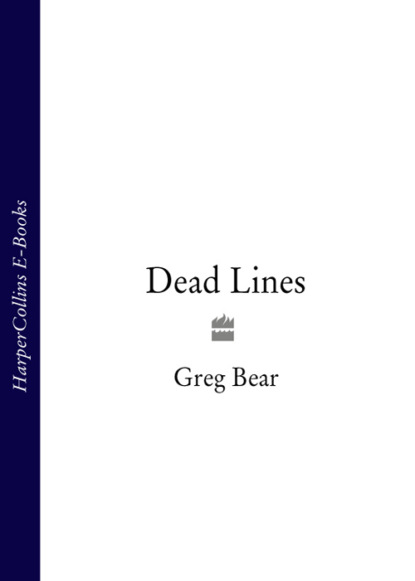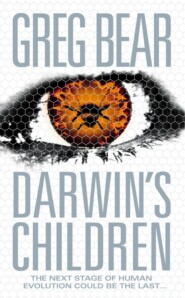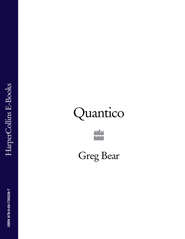По всем вопросам обращайтесь на: info@litportal.ru
(©) 2003-2024.
✖
Dead Lines
Настройки чтения
Размер шрифта
Высота строк
Поля
Pitiful, something left behind, dropped like an old Kleenex.
His heart slowed. The heat behind his eyes cooled. Finally, he had to blink. That instant with his eyes closed terrified him and he felt his neck tense and intestines curl.
Nothing came. Nothing touched him. Quiet and still. The room was innocent.
Nothing had actually happened.
Nothing real.
Peter was finally able to turn. He put out one foot as if rediscovering how to walk, then another, and slowly left the bedroom, reaching back with numb and inept fingers to close the door. The hangers caught. He could not close it all the way, so he angrily slammed it. The hangers jangled. One fell and bounced off the wood floor with a tinny resonance. The whine of the hanger wire made him grit his teeth, it sounded too much like the voice.
He gave up and walked on what felt like tingling stumps to the couch in the living room. Sat on the couch with hands folded on his lap. Did not even try to relax. Watched the carnival of the city across the water, darker now in the wee hours. His neck knotted and stayed that way.
He was still alive and wasn’t sure he wanted to be, not if he had to think about what he had just seen.
Peter watched the dawn light gather slowly over San Francisco, then burst forth along the eastern hills, reflecting gold against skyscrapers and banks of fog, the most beautiful sight of all: day.
He was making a big, grown-man decision. There was only one way to react – it must have been a bad dream – and two things to do. He walked into the kitchen and poured himself a bowl of Cheerios, chewing reflexively each milky mouthful. The milk had been in the fridge since Phil’s death and was on the edge of spoiling, but served well enough.
He forced himself to take a shower in the big bathroom, removing his clothes with catlike caution, climbing into the claw-foot tub, and drawing the curtain around on its pipe, tucked inside just enough to keep water from spraying on the floor, but with a clear view of the open bathroom door. This took tremendous will but it had to be done, and just this way. The water was set hot and stung his back. Phil did not believe in wimpy showers; no water inhibitor valves for him.
No Bergson valves.
As Peter scrubbed using Phil’s rounded block of Ivory soap, he tried to recall what a Bergson valve was. Something he had picked up reading The Doors of Perception in the sixties.
This is the end … beautiful friend.
Aldous Huxley. Something about drugs opening doors, or was it spigots? Letting the taps of reality flow free. He’d look it up when he got home. Or maybe Phil had a copy.
After toweling dry, he dressed in the living room, putting on his good wool slacks and a black long-sleeve shirt and the thrift-store suit coat to get ready for when they delivered Phil, or when – and he did not know how he would react to this – the real Lydia turned up again on the porch.
Peter washed the bowl in the sink and suddenly started snorting with laughter. It didn’t last long; it wasn’t funny, really. It was sad. ‘I see live people,’ he said, and started snorting again until he had to take off his glasses to wipe his nose and his eyes.
His best friend’s wake was today and he couldn’t keep his act together long enough to get a good night’s sleep. He had to start seeing things. Peter the screw-up, two nights running. Maybe he was hoping to draw attention to himself; poor Peter, maddened by loss once again.
Really sad.
The self-hatred built like bad clouds before a storm. Then it burst and went away. Peter’s ground state was a mellow kind of cheer, high energy at times, but usually slow to blame or anger. Sometimes he just reverted to the ground state when things got really bad, without explanation, but no solution either; the bad clouds inevitably returned. He would have to deal with them. Just not now.
‘It did not feel like a dream,’ he told himself. He was clean and well dressed, wearing his beige silk coat. He had become a figure of calm masculine dignity, grey-bearded, with wide-spaced and gentle eyes and glasses, lacking only a pipe.
Bring it on.
He sat on the porch swing, relishing the sun, the cool fresh air.
‘What a great house, Phil,’ he said. ‘Really.’
A dark blue unmarked panel truck came up the road trailing a thin cloud of exhaust and dust. It parked on the gravel beside the Porsche and a man in a dark brown suit got out, carrying a square cardboard box.
‘Is that Phil?’ Peter called from the porch.
‘Delivery for Ms. Lydia Richards,’ the man said, holding out the box in both hands. He had thick, theatrically wavy grey hair and walked and spoke with a jaded but professional dignity. Peter had once known a stripper who had married an undertaker. It was all about flesh, after all.
‘I’ll take him,’ Peter said.
‘Are you authorized by the family to receive the mortal remains of Mr Philip Daley Richards?’ the dignified man asked. ‘I’m family,’ Peter said, and signed for Phil’s ashes.
CHAPTER EIGHT (#ulink_5882663a-b6e1-5199-81a7-6ead2a9e016d)
Peter gingerly placed the box on the mantle of the fireplace. It barely fit.
The morning’s explanations weren’t making much sense now.
‘“Lydia, where did Phil die?”’ he rehearsed out loud, standing before the fireplace. ‘“Lydia, I don’t think he died in the house. Did you die in the house, Lydia? Because it wasn’t Phil who showed up this morning, in the dark.”’
He rubbed his lips as if to wipe away that potential conversation. Best to just let the wake roll on. Unlike Peter, Phil had not become a teetotaler. He would have appreciated a few drinks hoisted on his behalf. But solemn speeches and rows of furtive people dressed in black would have bummed him.
Peter looked down at his hands. They were trembling. He was not cut out to lose people. He was not cut out to face the death of loved ones, and he had loved Phil. Maybe he was not meant to be a friend or a husband or a daddy or any kind of serious human being. He had been at his happiest, he thought with a real twinge, facing the softer truths of young flesh, bawdiness and bodies live, parties on sets that sometimes turned into happy orgies. So much joy and laughter, walking around with a large pad of newsprint and a marker, wearing a wide floppy Shakespearean hat and nothing else, sketching his actors while orating like Richard Burton; loose easy conversations and kisses and oral sex and gentle, easy fucking and food, just between friends.
In the sixties and early seventies, he had stayed well away from the serious and somber.
He would have loved to go on that Old Farts Hot Dog Tour, had there been time; that would have been something he could have done well with Phil. This, he did not think he was going to do well.
‘“Lydia, do you burn incense, practice astral projection?”’
Peter gave it up.
At noon, still alone in the house, pacing, glancing at the mantel, Peter realized that the cardboard box was not decorous. He walked up to the fireplace and lowered the box to the brick hearth. Inside, a bronze-colored plastic urn looked both cheap and better. He lifted the urn from the box and centered it, creating two urns, one on the mantle, one in the mirror above the mantel. Phil and anti-Phil. Through the looking glass.
By one o’clock, Peter was irritated and not in the least nervous or worried about what he would say. By two, he was furious. He opened a can of baked beans from the back of the cupboard and ate them cold. He spooned up the sweet smoky beans and the little lump of pork fat and thought of all the pot-luck food Lydia would no doubt bring.
As he finished the last bite, the Trans chimed in his pocket. He answered.
‘Yeah?’
‘Have I reached the party to whom I am speaking?’
‘Who is this?’ Peter asked.
‘Stanley Weinstein. Mrs Benoliel told me you were in the Bay Area. I’m calling to say thanks.’
‘For what?’
‘For convincing Mr Benoliel to invest in our company.’
‘Did I?’
‘You did. And he did. We’re bubbly. I’m inviting you to come to the Big House and meet the crew. We have some of your reward, and if you’re interested, we might have some work for you. I’ve been doing my research. I didn’t know I was meeting a famous man.’









